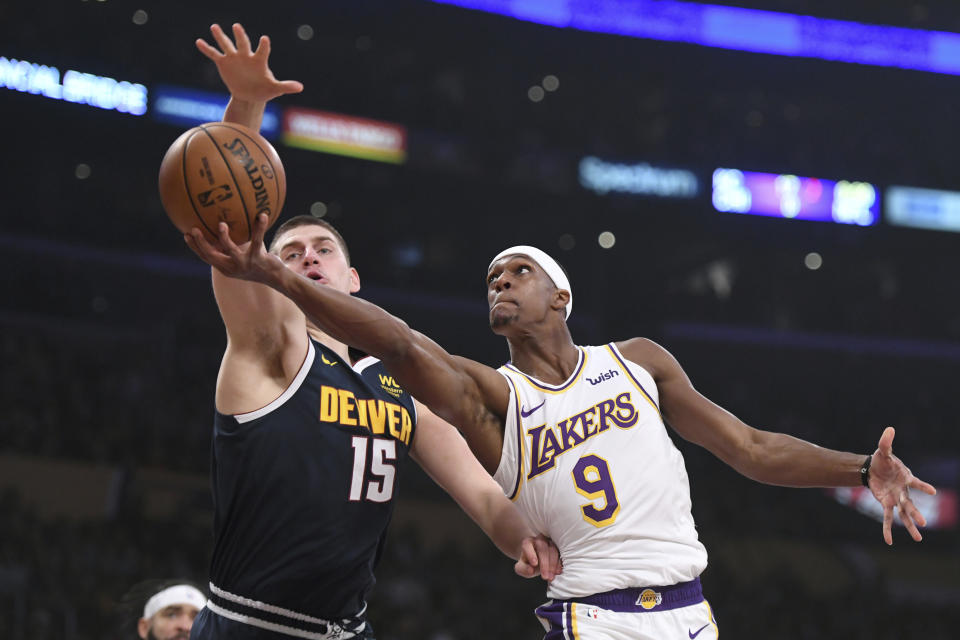Can we believe in the Denver Nuggets?
There was a time when two wings averaging 25 points per game for the same team was considered extraordinary — revolutionary, even. The Denver Nuggets of the 1980s, led by coach Doug Moe and then Paul Westhead, played with pace and whipped the ball around the floor, breaking records behind the scoring prowess of Kiki VanDeWeghe and Alex English. They shirked defense for offense, breaking the 100-point mark in every game of the 1981-82 season. In 1982, they lost 186-184 to the Detroit Pistons in the highest-scoring game ever. They still hold the record for most points per game averaged in a season at 126.48.
They looked like the future — our present — but at the time, you wouldn’t have known it. The Nuggets could never distinguish themselves in the Western Conference muck, topping out as Western Conference finals fodder for the 1984-1985 Los Angeles Lakers, who won a championship that year.
Innovators have a history of not winning titles. Just ask the Seven Seconds or Less Phoenix Suns. When the Golden State Warriors won their first title in 2015, Steve Kerr, who was the GM of that Suns team, dedicated the victory to coach Mike D’Antoni, who crafted the Suns’ system by weaponizing the cognitive powers of Steve Nash.
The 1980s Nuggets were too far ahead of their time, a fate the 2019-2020 Nuggets are trying to avoid. After shining in the playoffs, the Nuggets were expected to leap into contention this season, undergirded by the hope that star Serbian center Nikola Jokic would show up being what he is not: appreciably lighter, more nimble on defense — his Kryptonite — and willing to take over games in a league that is trending further toward superstars using a ton of possessions. But Jokic remains committed to the beautiful game (and his body weight), and to make matters worse, he slumped out of the gate. The low point came when the Nuggets went 1-3 on an East Coast swing in early December. “We kinda snuck up on people last year,” said wing Gary Harris. “We can’t sneak up on them this year.”

When the Nuggets got back to Denver, coach Mike Malone implored them to take advantage of a five-game home stand they have since rode to a seven-game winning streak and the best start in franchise history at 21-8. They are not as bad as they were on that road trip, but are they as good as they have been playing heading into their Christmas matchup against the New Orleans Pelicans? That question is tied inextricably to the unique blessings and challenges of constructing a system around Jokic, a modern throwback who might be the best passing big man of all time, creating new slivers and angles with his eyes and reappropriating the game from his perch straight away from the 3-point line.
“When you go back to our second season, we made a huge organizational decision to put him back in the starting lineup and play through him,” said Malone after the Nuggets beat the Lakers on Sunday. “Ever since that point in time, our offense has been a top-five offense. Now you have to surround him with players that complement what Nikola brings to the table. He’s an unbelievable passer, very unselfish, high IQ. So you need guys that can make shots but are also willing to run and move without the ball.”
Over the seven-game winning streak, the Nuggets’ offense is back to functioning like it’s used to, which was to be expected. You don’t worry about scoring. You worry about Jokic’s slow feet being subjected to pick-and-roll after pick-and-roll. You worry that a smart team with a star scoring ball-handler should never lose to the Nuggets in the playoffs because of how endlessly rich that particular well is.
The Nuggets, to their credit, have devised an excellent regular-season defense — No. 2 in the league, currently — pushing the limits of how much communication and continuity can make up for building around a liability. Clamp down in transition, contest hard and allow nothing one-on-one — characteristics that belie their personnel. They are difficult to decipher, but one gets the sense that in May, skip passes and deep threes could do them in — difficult moves, to be sure, unless you’re good enough to be in the hunt for a championship.
Creating off Jokic’s offense and compensating for his lack of defensive ability, the Nuggets are an interesting team built around an interesting player. But are they more than that?
Everything in the NBA, even on a macro level, is about timing and fit. Maybe Jokic’s defensive weaknesses wouldn’t matter as much in an era without so many strong isolation and pick-and-roll wing scorers, and maybe the question of why he doesn’t put his stamp on the game all the time wouldn't consistently haunt him if superstars sucking up half the game’s possessions weren’t all the rage. The latter, especially if the Nuggets ever consolidate their pieces into another star in the trade market, could be an advantage. It’s hard to imagine anyone not fitting in with Jokic, who doesn’t even have the highest usage rate on his team, but there is no blueprint for building around him.
In 2008, back when there was doubt about whether D’Antoni’s run-and-gun style could win a championship, Kerr took a turn toward convention and traded for an aging, plodding Shaquille O’Neal, the antithesis of Seven Seconds Or Less. It was the wrong decision, but at the time, he couldn’t have known it. So go the challenges of charting the unknown with an unproven and unpredictable entity.
All the Nuggets can do is tinker and push against their ceiling, and hope that the future Jokic is creating doesn’t become a blueprint for somebody else’s victory.
More from Yahoo Sports:
